Which I guess shouldn't be surprising. With both the sneaking suspicion that I may be getting a game console for my birthday and the announcement of the third World of Warcraft expansion, it's proving tough to think about anything that doesn't come with calloused thumbs, carpal tunnel, and the wholesale slaughter of hundreds of make-believe bastards.
So I thought I'd vent a little of that pixelated steam with a bit of nostalgia. Please remember, I'm not claiming to be some kind of video game expert. I am not saying these are the best video games of all time. In fact, as you will see, most hardcore gamers would probably have a thing or two to say with all the genres and platforms I'm mixing together here. These aren't "the best," they're just the ones I remember best.
10. Sonic the Hedgehog

If I remember correctly, my copy of Sonic came with my Sega Genesis.
My memories of the game aren't very clear. I just remember it was something of a landmark because it was the very first console game I ever finished. I think, before then, I never even considered the idea that you were supposed to finish or win video games. You just waited until you died too many times for the video game gods to allow you to continue.
9. Spider-Man and Venom: Maximum Carnage
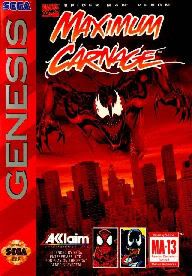
A side-scroller, and not necessarily a very good one, again on Sega Genesis. If memory serves, you play as Spider-Man for a few levels, Venom for a few, Spider-Man for a few, etc. In the final boss fight, you can switch between Spidey and Venom at will.
Like I said, it wasn't all that great. But the reason it rates is because I remember that it was while playing Maximum Carnage that I first had the urges - that I think probably a lot of regular video gamers had - that would later be realized in the form of the MMORPGs like World of Warcraft.
In Maximum Carnage a lot of different Marvel characters appeared. You couldn't control them like you could Spidey and Venom, but you could use them briefly. As the story of the game unfolded, characters like Black Cat, Captain America, and Moebius appeared. And while you couldn't control those characters, with the correct application of buttons, you could have one of them jump out on the screen briefly to kick some quick ass. If you were fighting trash, it would usually put them down for the count, and if you were fighting a boss it might take a nice chunk out of him.
I don't know why, but I remember thinking that it would SO cool if the Spider-Man I was controlling wasn't alone; that it would be awesome if he was in some kind of digital city somewhere on the Internet, and there would be tons of other people playing other super-heroes in that same city.
8. Nobunaga's Ambition
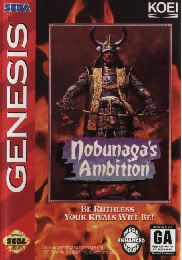
This was just a very cool strategy game. You play the part of a daimyo - a Japanese feudal lord - and your goal is to somehow conquer the rest of Japan, and you face the wills of something like 40 other automated daimyo. You had to micromanage the resources of your land, try to bribe skilled generals away from other daimyo, send your daughters to daimyo to help forge alliances, send ninja to assassinate rival daimyo, prepare for the frequent floods that could decimate your resources, etc. If you were willing to put the time into it, it was awesome.
I think I remember it so well for a few reasons. First, it was simply a challenging, enjoyable game. Second, it was one of the few historically based games I can remember playing that focused on something non-Western. Third and finally, it was the first war strategy game I played - before Civilization, Warcraft II, Starcraft, or Command & Conquer: Red Alert - that demanded strict micromanagement for success.
7. Spider-Man

Obviously, game developers can do things now with superhero games that blow this away, but Activision's early Spider-Man game for the Playstation was the first superhero game I ever played that really felt like it should've felt. Spidey had more range of action than he had ever had in his licensed games. As Spider-Man you could stick to walls, webswing across rooftops and rooms, drown bad guys in webbing, shoot little web pellets at bad guys, web up your fists to add some damage - you could even grab a guy with your web, pull him to you, and crack him across the chin in one quick move. Maybe pretty standard fare for games these days, but at the time it felt like someone had reinvented video games just for good ol' webhead. And if that wasn't enough, the game was narrated by Stan Lee, making it feel like an extended episode of Spider-Man and His Amazing Friends.
6. Final Fantasy X

It's tough to say much about this, because it will feel redundant when you get a bit further down the list to Final Fantasy VII. But I will say that, at least in part, this game was a close companion during some memorable times. I remember I played it pretty regularly when I moved into the first apartment I ever had on my own - a basement studio piece of shee-ite in downtown Albany. I remember that my TV was too old to play nice with my PS2, so the colors would keep fading in and out while I played.
5. Half-Life
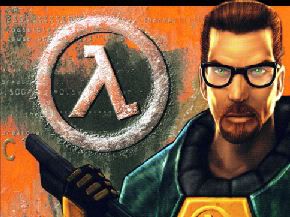
Not the first first-person shooter I ever played (that honor belongs to Wolfenstein 3-D), but the first I ever owned. It would later introduce me to the online madness that was Team Fortress and Counterstrike. It would teach me that, in an online FPS, everything is gay to your opponents. Everything. Getting shot by them is gay. Shooting them is gay. Having sex with a member of the opposite sex? Yep. Still gay.
4. Ultima IV: Quest of the Avatar
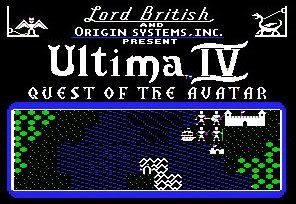
I honestly had no idea what the fuck to make of this thing when my father first gave it to me. It was #4 in a series and I'd never played or even heard of parts 1, 2, or 3. But it was massive and epic and I loved it even though I could A) never survive a single dungeon or B) ever figure out what the fuck I was supposed to be doing.
3. Final Fantasy VII
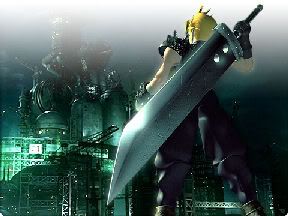
I remember not only that it was George Carlin, but the exact joke, that first taught me the potential of comedy ("They're thinking about banning toy guns...AND THEY'RE GONNA KEEP THE FUCKIN' REAL ONES!!!"). I remember it was Peter David's writing on The Incredible Hulk that first taught me that comic books could be true art. And I remember it was Final Fantasy VII that taught me the potential of video games.
Back in Tampa, this game made me miss class. And I LIKED class. I had all writing courses for fuck's sake. I wasn't just addicted to this game. I cared about this game. I cared about its characters and its (insanely convoluted) story. It was emotional and uplifting and I never wanted it to end.
The game begins in a city run by a crooked corporation called Shin-Ra. The section that takes place in the city feels like an entire video game. It takes a LONG time. Unless you sit in front of your console for hours and hours and hours at a time, it will probably take you days. Maybe a week. Probably at least a week.
Then you leave the city. And you find out the city is maybe, what...1/10th of the game? Maybe less?
I'm not a macho guy. I will admit to things making me cry. The last story of Lone Wolf and Cub made me cry. To my neverending shame, Moulin Rouge made me cry. Fuck, the end of Bubba Ho-Tep made me cry a little bit.
A video game has never made me cry. But if a video game ever does make me cry, it will be Final Fantasy VII.
Or, if they ever come out with an onion-cutting simulator, maybe that.
2. World of Warcraft

Yeah, this whole list would be a big stinking lie without mentioning World of Warcraft now wouldn't it?
I'm not even sure what to say. I've spent so much time on WoW, and may very well again, I think it deserves its own list.
It's addictive. It's huge. It has a rich, Tolkien-esque history as its foundation. And dwarves are better than everyone else. Yes. EVERYONE.
1. Infocom
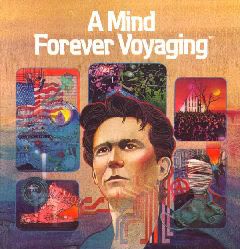
Okay, well the final entry here is a stretch for two reasons. First, Infocom was not a game. Infocom was a company that made games. It isn't around anymore. Second, Infocom's games were not, technically speaking, video games for the most part. At least, the Infocom games I'm talking about weren't video games. They were text adventure games.
That's right. Text adventure. No mouse. No joystick. You had to read a description, and tell the computer what to do by typing.
It could be frustrating. It was usually frustrating. You had to become a thesaurus. You could spend days telling the computer exactly what you wanted to do, and even if it was exactly what you were supposed to do, it didn't matter if you didn't use the right word - if say, for example, you told the game you wanted to "leap" but the game only recognized "jump." You would waste weeks going around mazes and either forgetting what direction your character was going in, or alternatively driving yourself insane by keeping track of every single twist and turn you made.
My father introduced me to Infocom by buying me The Hitchhiker's Guide to the Galaxy (which I played long before I ever picked up the book) when I was in junior high. I was only able to finish it by buying the hint book from Infocom. They would send you this little book with hints written in invisible ink. And the booklet came with a highlighter. For every problem, you had to highlight each hint in order to be able to read it. The final hint would simply tell you exactly what to do in order to get past the problem. This way, if you just wanted hints and didn't want the whole thing spelled out for you, you refrained from highlighting everything.
The first Infocom game I finished without a hint book was Witness, a noirish whodunnit, and I practically wanted to throw a fucking party. The next - and the ONLY other I would solve without a hint book - was A Mind Forever Voyaging, which really wasn't a game so much as an interactive novel. There were problems to solve, but to a veteran Infocom player they were obvious. But it was no less enjoyable. In the game, you were a computer fooled into thinking you were a real person, and "awoken" in order to run simulations testing whether or not a radical new plan for the country would bring about a paradise or a disaster. The enjoyment of Voyaging didn't come from puzzle-solving, but simply exploring the rich texture of the worlds the developers created.
There were games I never won. I remember ordering the hint book to the whodunnit Deadline and having my envelope sent back to me with a stamp that indicated the company no longer existed. So Deadline, the desert adventure Infidel and the space thriller Starcross (a game for which I never even received the slightest clue as to what the fuck I was supposed to be doing) all went unsolved. I only finished the dungeon adventures Zork I and Zork II with the hint books. Zork III would remain a mystery. I never even got to buy Beyond Zork or Zork Zero before the company tanked.
I literally taught myself to type on Infocom's games. No bullshit. By the time I finished The Hitchhiker's Guide to the Galaxy, I could type like I'd been doing data entry for years. Granted, I could only type with my index fingers, but still.
It's possible some of the games are still available online somewhere. I'm pretty sure some of them are. But I've never really bothered because I just don't think I could care as much about them now as I did then, and that makes me just a little sad.
2 comments:
Oh man, this brings me back. I miss those Infocom games. Much of my youth was wasted with them. Those, and The Bard's Tale, Ultima 7, (my fave) The original Battletech trilogy and all the Wing Commander junk. Ooh! And the Star Wars flight games - X-Wing, Tie Fighter, X-Wing vs. Tie Figher, etc. My dearest gaming wish is that soon the technology will be available for LucasArts to release a multiplayer X-Wing type game that will allow us to engage in battles of the scale seen in the movies.
I thought that eventually the Star Wars Galaxies developers were going to have a space travel/fighting section of the game. I don't know if that ever happened or if it ever really worked.
I also remember my brother had Star Wars Battlefront II on his Xbox. He said you could go online with it and there were some parts of it where you could have space battles, but that most of the people were dicks and everyone just ended up doing things like destroying their own ships on purpose.
Post a Comment